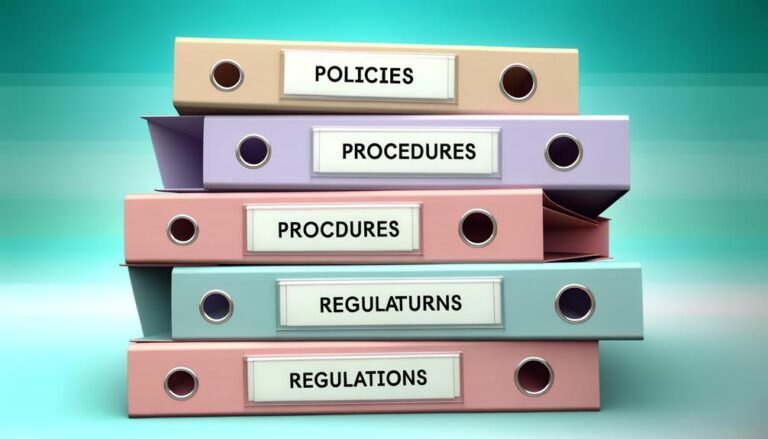Compliance In Ireland: Meeting Workplace Standards And Regulations
Are you tired of following rules and regulations at work?
Do you find yourself daydreaming about a world where compliance is just a distant memory?
Well, I’m here to burst your bubble and tell you that compliance in Ireland is no joke.
In fact, it’s serious business.
So serious, in fact, that failing to meet workplace standards and regulations can land you and your organization in hot water.
But fear not!
In this article, we’ll delve into the world of compliance in Ireland, exploring the key regulations you need to be aware of and how to implement a robust compliance program.
So buckle up and prepare to navigate the intricate maze of Irish workplace standards with finesse.
Key Takeaways
- Compliance in Ireland is crucial for businesses to meet workplace standards and regulations.
- Key compliance regulations in Ireland include workplace safety regulations and the General Data Protection Regulation (GDPR).
- Compliance training should cover workplace health and safety, data protection, and anti-discrimination policies.
- Regular monitoring, enforcement of policies, and clear reporting mechanisms are essential for effective compliance.
Understanding Compliance in Ireland
So, you’re trying to wrap your head around compliance in Ireland, huh? Well, let’s start by understanding the compliance requirements and regulatory framework that businesses need to adhere to in this country.
Compliance refers to the act of following laws, regulations, and industry standards that are set by governing bodies. In Ireland, there are several key compliance requirements that businesses must meet in order to operate legally and ethically.
The regulatory framework in Ireland is comprehensive and covers a wide range of areas such as employment law, health and safety regulations, data protection rules, environmental legislation, financial reporting requirements, and more. These regulations are put in place to protect employees’ rights, ensure fair competition among businesses, safeguard consumers’ interests, and maintain the overall integrity of the Irish business environment.
When it comes to compliance in Ireland, businesses must be proactive in staying up-to-date with any changes or updates to these regulations. Ignorance of the law is not an excuse when it comes to non-compliance. Therefore, it’s crucial for organizations operating in Ireland to have robust systems and processes in place that monitor their adherence to all relevant regulatory requirements.
Now that you understand the basics of compliance requirements and the regulatory framework in Ireland, let’s delve deeper into some key compliance regulations you should be aware of.
Key Compliance Regulations in Ireland
One cannot simply ignore the myriad of rules and red tape that bind businesses in the Emerald Isle. Compliance with workplace safety regulations is of utmost importance in Ireland, as employers are legally obligated to provide a safe working environment for their employees.
This includes ensuring proper training, implementing safety protocols, and regularly inspecting equipment and facilities. Failure to comply with these regulations can result in fines or even criminal charges.
Data protection is another key aspect of compliance in Ireland. The General Data Protection Regulation (GDPR) sets strict guidelines on how businesses handle personal data. Companies must obtain explicit consent from individuals before collecting their information and must take measures to protect this data from unauthorized access or breaches.
Non-compliance with GDPR can lead to hefty fines, reputation damage, and loss of customer trust.
To ensure compliance with workplace safety regulations and data protection laws, businesses in Ireland need to implement a robust compliance program. This involves conducting regular audits, providing ongoing training for employees, and staying up-to-date with any changes or updates in regulations.
A proactive approach to compliance not only ensures legal adherence but also helps create a culture of safety and trust within the organization.
Now that you understand the key compliance regulations in Ireland, let’s delve into the next section about implementing a robust compliance program without delay.
Implementing a Robust Compliance Program
Ready to take your business to the next level? Let’s explore how you can establish a strong compliance program that ensures safety, protects data, and builds trust within your organization.
Compliance training is a crucial component of implementing a robust compliance program in Ireland. By providing comprehensive training to your employees, you can ensure that they’re aware of the regulations and standards they need to adhere to in their day-to-day work. This training should cover topics such as workplace health and safety, data protection, anti-discrimination policies, and any industry-specific regulations that apply to your business.
In addition to providing thorough compliance training, it’s important to have effective compliance monitoring mechanisms in place. This involves regularly assessing and evaluating your organization’s adherence to the established standards and regulations. Compliance monitoring can take various forms, such as conducting regular audits or inspections, reviewing documentation and records, or implementing automated systems for tracking compliance-related activities. By continuously monitoring compliance within your organization, you can identify any areas of non-compliance or potential risks early on and take corrective actions promptly.
By establishing a strong compliance program through comprehensive training and effective monitoring practices, your business can reap numerous benefits. Firstly, it helps ensure the safety of your employees by promoting a culture of awareness about workplace hazards and proper protocols for handling them. Secondly, it protects sensitive data by ensuring that all necessary measures are taken to safeguard information from unauthorized access or breaches. Lastly, building trust within your organization becomes easier when employees see that their employer prioritizes adhering to regulations and maintaining ethical practices.
Transitioning into the subsequent section about the benefits of compliance in Ireland, it’s clear that having a robust compliance program not only keeps you in line with legal requirements but also provides tangible advantages for your business operations overall.
Benefits of Compliance in Ireland
Implementing a robust compliance program in Ireland brings numerous advantages to your business, from ensuring employee safety and data protection to fostering a culture of trust and ethical practices. By meeting the legal requirements set forth by regulatory bodies, you can avoid costly fines and penalties that may arise from non-compliance. Additionally, adhering to workplace standards and regulations helps protect your employees from hazards, reducing the risk of accidents and injuries. This not only demonstrates your commitment to their well-being but also boosts morale and productivity.
In today’s digital age, data protection is of utmost importance. Compliance ensures that your business handles sensitive information in a secure manner, protecting both customer data and your company’s reputation. By implementing appropriate security measures and safeguarding personal information, you build trust with customers who value privacy. Compliance also helps prevent data breaches which can lead to financial loss, legal consequences, and damage to your brand image.
Moreover, compliance fosters a culture of trust within your organization. When employees see that their employer takes workplace standards seriously, they are more likely to follow suit and prioritize ethical practices themselves. This creates an environment where everyone feels valued and respected, leading to increased job satisfaction and retention rates. Furthermore, businesses that prioritize compliance are often seen as reliable partners by other organizations in the industry.
Transition: Having understood the benefits of implementing a robust compliance program in Ireland for your business, it is essential to know the steps required to achieve effective compliance without compromising on quality or efficiency.
Steps to Achieve Effective Compliance
To successfully achieve effective compliance, businesses in Ireland must embark on a strategic journey that encompasses thorough risk assessments, diligent policy development, and comprehensive staff training.
The compliance process begins with conducting a detailed risk assessment to identify potential areas of non-compliance. This involves evaluating internal systems, processes, and operations to pinpoint any gaps or vulnerabilities that may exist. By understanding the specific risks faced by their organization, businesses can then develop tailored policies and procedures to address these concerns.
Once the risks have been identified and policies developed, the next crucial step is providing comprehensive compliance training to all staff members. This ensures that employees are aware of their obligations and understand how to meet workplace standards and regulations. Compliance training should cover topics such as data protection, health and safety protocols, anti-discrimination laws, and ethical guidelines. It should be an ongoing process that keeps pace with changing regulations and industry best practices.
Effective compliance also requires regular monitoring and enforcement of policies. Organizations should establish clear reporting mechanisms for employees to raise concerns or report violations anonymously if necessary. Regular audits should be conducted to assess the effectiveness of compliance measures and identify areas for improvement. By fostering a culture of accountability where non-compliance is not tolerated, businesses can maintain high standards of conduct while mitigating risks.
Achieving effective compliance in Ireland requires a proactive approach that includes thorough risk assessments, diligent policy development, and comprehensive staff training. By implementing these steps as part of the compliance process, organizations can ensure they meet workplace standards and regulations while safeguarding against potential risks. With ongoing monitoring and enforcement of policies in place, businesses can foster a compliant culture that promotes ethical behavior throughout the organization.
Frequently Asked Questions
What are the consequences for non-compliance with workplace standards and regulations in Ireland?
If you don’t comply with workplace standards and regulations in Ireland, you could face serious consequences. For instance, a construction company was fined €500,000 for safety breaches, highlighting the importance of following these standards to avoid legal and financial penalties.
Are there any specific industry-specific compliance regulations in Ireland?
In Ireland, there are industry-specific compliance regulations that companies must adhere to. These regulations vary depending on the sector and may require regular review and updates of compliance programs.
How often should a company review and update its compliance program in Ireland?
To ensure your compliance program remains effective, review and update it regularly. Best practices recommend conducting reviews at least annually, but consider more frequent updates if there are significant regulatory changes or internal process modifications.
Are there any government incentives or support programs available to companies that demonstrate a high level of compliance in Ireland?
There are government incentives and support programs available in Ireland for companies that demonstrate a high level of compliance. These programs offer benefits such as financial assistance, tax breaks, and access to resources for maintaining compliance standards.
What is the role of employees in ensuring compliance with workplace standards and regulations in Ireland?
To ensure compliance with workplace standards and regulations in Ireland, it is crucial for employees to undergo comprehensive training. They have responsibilities and obligations to adhere to these standards, contributing to a safe and legally compliant working environment.
Conclusion
In conclusion, ensuring compliance in Ireland is crucial for businesses to meet workplace standards and regulations. By implementing a robust compliance program, companies can navigate the complex regulatory landscape effectively.
Compliance not only helps organizations avoid legal issues and penalties but also promotes a safe and fair working environment for employees.
Just like a lighthouse guides ships through treacherous waters, compliance serves as a beacon of guidance for businesses in Ireland. It illuminates the path towards success by providing clear guidelines and expectations. Failure to comply with regulations can be detrimental, causing reputational damage and financial loss.
To achieve effective compliance, businesses must stay up-to-date with key regulations such as health and safety requirements, employment laws, data protection regulations, and anti-discrimination legislation. Implementing comprehensive policies and procedures helps create a culture of adherence to these standards.
By prioritizing compliance, organizations benefit from improved operational efficiency, reduced legal risks, enhanced reputation among stakeholders, and increased employee satisfaction. Compliance isn’t just about ticking boxes; it establishes a strong foundation for long-term success in the Irish business landscape.
To embark on the journey towards compliance excellence in Ireland, businesses should take proactive steps such as conducting regular audits to identify areas of improvement, providing ongoing training to employees on regulatory requirements, and appointing dedicated compliance officers or teams within the organization to oversee monitoring and enforcement efforts.
In summary, complying with workplace standards and regulations in Ireland is essential for businesses seeking sustainable growth. Just like navigating through uncharted territory requires careful navigation tools like maps or compasses, achieving compliance ensures that companies steer clear of potential pitfalls while staying on course towards success in the Irish business landscape. So embrace compliance wholeheartedly—it’s your guiding star!







